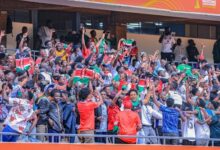Angola Insists DRC Peace Talks Will Proceed Despite M23’s Withdrawal

Angola has reaffirmed that peace talks between the Democratic Republic of Congo (DRC) government and the M23 rebels will go ahead as planned this Tuesday in Luanda, despite the last-minute withdrawal of M23’s delegation.
The Congolese delegation has already arrived in the Angolan capital, where mediators are determined to proceed with negotiations aimed at resolving the escalating conflict in eastern DRC.
“All conditions have been created for the start of direct negotiations tomorrow, March 18, as planned,” the Angolan presidency announced, underscoring its role as a mediator in the crisis.
The development comes just hours after M23 rebels declared they would not participate in the talks, citing the European Union’s fresh sanctions against their senior leaders, including political chief Bertrand Bisimwa.
Sanctions bite
The EU imposed the sanctions on March 17, targeting M23 leaders and senior Rwandan military officials for allegedly fueling the conflict and benefiting from the exploitation of DRC’s natural resources.
Bertrand Bisimwa, M23’s political leader was sanctioned for orchestrating rebel governance in occupied areas while Jean-Bosco Nzabonimpa Mupenzi, the group’s finance chief, was accused of overseeing the sale of conflict minerals.
John Imani Nzenze, an intelligence officer of M23 and Joseph Bahati Musanga, whom M23 appointed as “Governor of North Kivu” in occupied territories were also sanctioned.
The M23’s abrupt decision to pull out of the talks marks a major setback for Angola’s mediation efforts, which have been backed by the African Union and regional blocs like the East African Community (EAC) and the Southern African Development Community (SADC).
M23’s political leadership had initially accepted Angola’s invitation and announced plans to dispatch a five-member delegation to Luanda.
However, following the EU sanctions, the rebels accused the international community of “sabotaging peace efforts” while supporting Kinshasa’s military operations.
“It is impossible to engage in negotiations under such conditions, where international actors are taking sides rather than facilitating dialogue,” said M23 spokesman Lawrence Kanyuka on Monday night.
Talks Proceed
Despite M23’s absence, the Congolese government said it remained committed to the talks, with President Félix Tshisekedi’s administration emphasizing its preference for diplomatic solutions within the framework of the Luanda and Nairobi processes.
However, Kinshasa has also been cautious, with government spokesperson Tina Salama stating that the DRC “takes note” of Angola’s insistence on talks but will assess their implementation.
The Congolese delegation in Luanda includes representatives from the presidency, foreign affairs, and defense ministries, who are expected to lay out Kinshasa’s conditions for de-escalation, including M23’s full withdrawal from occupied territories.
The stalled talks come at a time of heightened international pressure on Rwanda, accused of backing M23. Just hours before the negotiations, Rwanda and Belgium severed diplomatic ties, further straining regional relations.
The United States, the United Kingdom, and the European Union have all imposed sanctions on Kigali, with Washington recently targeting Rwandan Minister of State Gen. James Kabarebe for his alleged role in orchestrating M23’s military operations.
Meanwhile, fighting continues in eastern DRC, where M23 rebels have advanced on key strategic areas, including Walikale, home to the region’s richest tin and gold deposits.
With the Angolan-mediated peace process at risk of collapse, attention now turns to whether regional powers can convince M23 to return to the negotiating table.
The absence of the rebels raises serious doubts about the effectiveness of ongoing diplomatic efforts, with some analysts warning that without M23’s involvement, the talks risk becoming a one-sided exercise rather than a genuine peace settlement.







